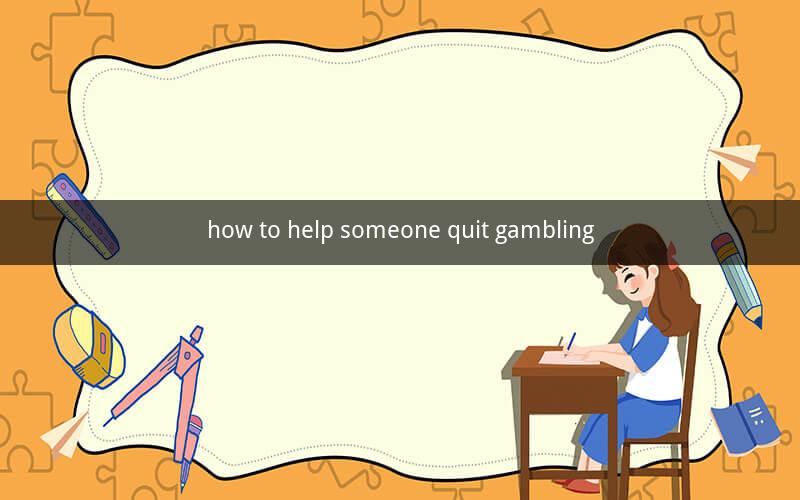
Contents
1. Understanding the Problem
2. Identifying Signs of Problem Gambling
3. Communication Strategies
4. Support Systems
5. Professional Help
6. Setting Boundaries
7. Creating a Supportive Environment
8. Encouraging Self-Reflection
9. Alternatives to Gambling
10. Staying Committed to Change
---
1. Understanding the Problem
Gambling addiction is a complex issue that affects individuals from all walks of life. To help someone quit gambling, it is essential to first understand the nature of the problem. Problem gambling, also known as compulsive gambling, is characterized by an inability to control the urge to gamble, despite negative consequences. This addiction can lead to financial, emotional, and social problems, making it crucial to intervene effectively.
1. Identifying Signs of Problem Gambling
Recognizing the signs of problem gambling is the first step in providing support. These may include secretive behavior, borrowing money, missing work or school, and a preoccupation with gambling. It is important to be aware of these signs to offer the right kind of assistance.
1. Communication Strategies
Effective communication is key when helping someone quit gambling. Approach the subject with empathy and concern, rather than judgment. Use "I" statements to express your feelings and concerns, such as "I am worried about your gambling habits" instead of "You are a problem gambler." Listen actively and encourage them to share their feelings and experiences.
1. Support Systems
Creating a support system is crucial for someone struggling with gambling addiction. This can include friends, family, and support groups. Encourage them to seek out resources such as Gamblers Anonymous or counseling services. A strong support network can provide emotional support and practical assistance throughout the recovery process.
1. Professional Help
In many cases, professional help is necessary to overcome gambling addiction. Therapists, counselors, and addiction specialists can provide tailored support and treatment options. Therapy may include cognitive-behavioral therapy (CBT) or other evidence-based approaches to address the underlying issues contributing to the addiction.
1. Setting Boundaries
Helping someone set boundaries around gambling is an important aspect of recovery. This may involve restricting access to gambling sites or limiting the amount of money they can spend on gambling activities. Encourage them to establish clear rules for themselves and hold them accountable.
1. Creating a Supportive Environment
A supportive environment can significantly aid in the recovery process. Encourage activities that do not involve gambling and help them find new hobbies or interests. Celebrate small victories and milestones to keep them motivated.
1. Encouraging Self-Reflection
Self-reflection is a powerful tool in overcoming addiction. Encourage the individual to reflect on the impact of their gambling habits on their life. This can help them understand the need for change and motivate them to seek help.
1. Alternatives to Gambling
Finding alternatives to gambling can be challenging but is essential for recovery. Suggest engaging in sports, arts, volunteering, or other activities that provide a sense of fulfillment and reduce the urge to gamble.
1. Staying Committed to Change
Recovery from gambling addiction is a lifelong journey. Encourage the individual to stay committed to change and to seek support whenever needed. Remind them that relapse is a part of the process and that they are not alone in their struggle.
---
Q1: What are some immediate steps to take when someone you know is struggling with gambling addiction?
A1: Immediate steps include having an open and non-judgmental conversation, offering your support, and encouraging them to seek professional help or join a support group.
Q2: How can you help someone maintain their commitment to quit gambling?
A2: You can help by providing consistent support, celebrating milestones, and encouraging them to engage in non-gambling activities that they enjoy.
Q3: What role do family and friends play in the recovery process for a problem gambler?
A3: Family and friends can play a significant role by offering emotional support, participating in support groups, and holding the individual accountable to their recovery plan.
Q4: Can therapy alone help someone quit gambling?
A4: While therapy can be an effective component of treatment, it is often most beneficial when combined with other strategies, such as support groups and lifestyle changes.
Q5: How can you help a loved one who is in denial about their gambling problem?
A5: You can help by expressing your concerns in a non-confrontational manner, offering information about the consequences of gambling addiction, and encouraging them to seek professional help.
Q6: What are some alternative activities that can replace gambling for someone in recovery?
A6: Alternative activities can include sports, arts, crafts, music, volunteering, and learning new skills. These activities can provide a sense of accomplishment and fulfillment.
Q7: How can you help someone who has lost significant money due to gambling?
A7: You can help by offering support, helping them address any financial consequences, and encouraging them to seek professional help to address the underlying gambling addiction.
Q8: What should you do if a loved one relapses after trying to quit gambling?
A8: If a loved one relapses, it is important to remain supportive and remind them that relapse is a part of the recovery process. Encourage them to seek help from their therapist or support group.
Q9: How can you support a friend or family member who is in debt due to gambling?
A9: You can support them by helping them create a budget, exploring debt consolidation options, and encouraging them to seek professional help for their gambling addiction.
Q10: What resources are available for individuals struggling with gambling addiction?
A10: Resources include Gamblers Anonymous, counseling services, therapy programs, and support groups. Online resources and hotlines are also available for those seeking assistance.